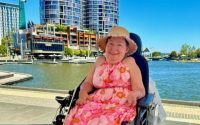You can outrun your bad genes and live longer: study
Turns out you can outrun your bad genes.
Exercise can triumph over genetics even if you’re not predisposed to longevity, wearing out the age-old excuse that bad genes are to blame for shorter lifespans, new research from the University of California San Diego suggests.
While certain individuals are genetically predisposed to live longer than others, the research team at UCSD looked into whether or not these people can carry out more stagnant lifestyles and still live longer than others. They published their findings in the “Journal of Aging and Physical Activity” this month.
“The goal of this research was to understand whether associations between physical activity and sedentary time with death varied based on different levels of genetic predisposition for longevity,” Alexander Posis, lead study author at San Diego State University/UC San Diego Joint Doctoral Program in Public Health, said in a press release.
Researchers began the study in 2012 and tracked the physical activity and lifestyle habits among 5,446 women aged 63 or older through 2020. Each wore a device to measure how often they moved, how intense the physical activity was and how much time was spent sitting.

They found higher levels of light to moderate and vigorous exercise were associated with lowering the risk of death during the period tracked. What’s more, they found those who spent more time in a sedentary state had a higher risk of death.
The key discovery was that the connection between exercise and living longer was apparent even with women found to have different levels of genetic predisposition for longevity.
“Even if you aren’t likely to live long based on your genes, you can still extend your lifespan by engaging in positive lifestyle behaviors such as regular exercise and sitting less,” said senior author Aladdin H. Shadyab, Ph.D., assistant professor at the Herbert Wertheim School of Public Health and Human Longevity Science at UC San Diego. “Conversely, even if your genes predispose you to a long life, remaining physically active is still important to achieve longevity.”
The authors suggested in the study that older women should participate in physical activity “of any intensity to reduce the risk of disease and premature death.”


